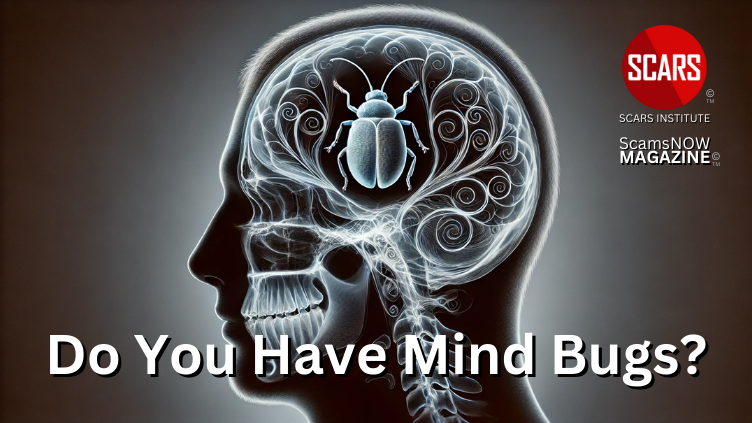Knowledge Paralysis – Learning the Name of a Disorder or Condition Can Cause Scam Victim Recovery to Stop
Knowledge Paralysis is When Scam Victims’ Awareness Halts Recovery Progress
Primary Category: Scam Victim Recovery Psychology
Authors:
• Vianey Gonzalez B.Sc(Psych) – Licensed Psychologist, Specialty in Crime Victim Trauma Therapy, Neuropsychologist, Certified Deception Professional, Psychology Advisory Panel & Director of the Society of Citizens Against Relationship Scams Inc.
• Tim McGuinness, Ph.D., DFin, MCPO, MAnth – Anthropologist, Scientist, Polymath, Director of the Society of Citizens Against Relationship Scams Inc.
About This Article
Knowledge Paralysis is a psychological state where scam victims, after achieving some understanding or awareness of their situation, mistakenly believe that this knowledge alone equates to resolution, causing them to halt further progress in their recovery. This phenomenon involves cognitive biases like the illusion of control, false sense of mastery, and overconfidence bias, which lead to complacency and avoidance of necessary actions for healing.
Similar to Analysis Paralysis—where overthinking leads to inaction due to fear of making the wrong decision—Knowledge Paralysis results in stagnation because individuals assume that understanding the problem solves it. Overcoming this requires a shift in mindset, promoting active engagement, challenging cognitive distortions, and providing continuous support to help victims move beyond mere awareness toward actionable steps for genuine recovery.

Knowledge Paralysis: When Scam Victims’ Awareness Halts Recovery Progress
“Knowledge Paralysis” is a term used to describe a psychological state where individuals (scam victims,) often traumatized or struggling with a mental or emotional challenges, seek understanding of their situation but stop progressing as soon as they achieve some degree of awareness or knowledge about it. This phenomenon, which is linked to various psychological and behavioral patterns, cognitive biases, logical fallacies, and distorted schemas, presents a significant barrier to effective recovery and personal growth for many scam victims.
Understanding Knowledge Paralysis
Knowledge Paralysis occurs when individuals mistake awareness for resolution. Upon receiving a diagnosis, label, or explanation for their struggles, they can feel a sense of relief or mastery. However, this often leads to a false sense of security, which can prevent them from taking further steps toward meaningful change or treatment.
Here are some of the key psychological and cognitive components of Knowledge Paralysis:
Illusion of Control
The illusion of control is the belief that understanding or identifying a problem equates to controlling or resolving it. In the context of Knowledge Paralysis, individuals may feel that knowing their diagnosis is sufficient to manage their condition, even if they have not yet developed the necessary tools, skills, or coping mechanisms. This false confidence can delay or entirely block progress toward real solutions.
False Sense of Mastery
A cognitive distortion that underpins Knowledge Paralysis is the false sense of mastery. Here, individuals believe they have overcome their challenge merely by learning about it. This mindset neglects the complexities of true mastery, which often require active practice, adaptation, and sustained effort.
Label-Induced Complacency
Receiving a diagnosis or label for a condition can bring temporary relief, as it validates and explains an individual’s experiences. However, this validation can also lead to complacency. The person may believe that the label itself is sufficient to explain or justify their struggles, leading to a premature sense of resolution and an avoidance of deeper exploration or necessary action.
Overconfidence Bias
Knowledge Paralysis is often reinforced by overconfidence bias, where individuals overestimate their ability to address their challenges based on minimal understanding or experience. This can result in dismissing professional advice or oversimplifying the steps required for effective management or recovery.
Diagnosis-Induced Relief
For many, receiving a diagnosis brings emotional relief by putting a name to their struggles. While this relief is beneficial in the short term, it can create a deceptive sense that the issue is now manageable or under control, discouraging further proactive efforts.
Why Knowledge Paralysis is Problematic
Knowledge Paralysis is not inherently negative; awareness is an essential first step in addressing any issue. However, when individuals mistake awareness for resolution, it can lead to stagnation or even denial. The danger lies in:
Complacency: Believing that no further action is needed beyond understanding the issue.
Avoidance: Delaying or avoiding the hard work of treatment, therapy, or self-improvement.
Denial: Refusing to engage with the reality of the ongoing challenges because the diagnosis or label provides a false sense of closure.
This state can be particularly detrimental for those recovering from trauma or crime-related experiences. While recognizing their situation is crucial, victims often need consistent support and actionable strategies to move forward effectively.
The Connection Between Knowledge Paralysis and ‘Analysis Paralysis’
Knowledge Paralysis shares similarities with Analysis Paralysis, a concept often used to describe decision-making stagnation caused by overanalyzing information. Both phenomena involve a form of mental or emotional “freezing,” where individuals fail to progress or take meaningful action despite possessing the necessary information. Here’s how they compare and overlap:
Overabundance vs. Overconfidence
In Analysis Paralysis, individuals are overwhelmed by an excess of information or choices, leading to indecision. They become stuck in a loop of evaluating options, fearing that a wrong decision could lead to failure or regret.
In Knowledge Paralysis, individuals feel a false sense of confidence or mastery after acquiring knowledge, believing that understanding alone is sufficient. This overconfidence can halt their progress as they underestimate the effort required to move forward.
Avoidance of Action
Both states lead to inaction but for different reasons:
In Analysis Paralysis, the inaction stems from fear of making the wrong choice. The individual avoids taking a step because they want to ensure their decision is perfect.
In Knowledge Paralysis, the inaction stems from a false sense of completion. The individual avoids further action because they believe understanding the problem equates to solving it.
Cognitive Overload vs. Cognitive Bias
Analysis Paralysis arises from cognitive overload, where the brain struggles to process and prioritize an overwhelming amount of data.
Knowledge Paralysis is often fueled by cognitive biases, such as the illusion of control, overconfidence bias, or a false sense of mastery. These biases create a mental shortcut, convincing individuals that knowledge alone resolves their issue.
Impacts on Decision-Making
In Analysis Paralysis, the individual’s inability to act may result in missed opportunities or prolonged uncertainty, as decisions are delayed indefinitely.
In Knowledge Paralysis, the individual’s failure to act on their knowledge can lead to complacency, worsening their situation due to a lack of proactive measures.
Breaking the Paralysis
Overcoming both Knowledge Paralysis and Analysis Paralysis requires a shift in mindset:
For Analysis Paralysis, the focus should be on simplifying choices, setting deadlines, and adopting a “good enough” mentality to encourage actionable steps rather than striving for perfection.
For Knowledge Paralysis, individuals need to recognize that knowledge is only the starting point and must be paired with consistent action, effort, and adaptability to create meaningful change.
The Link: A False Sense of Security in Thought
Both forms of paralysis share a common thread: they represent a reliance on thought without translating it into action. Whether due to fear of imperfection (Analysis Paralysis) or an inflated sense of control (Knowledge Paralysis), the result is the same—stagnation. Understanding this link highlights the importance of balancing thought and action, using knowledge and analysis as tools rather than endpoints.
In both cases, the antidote lies in actionable steps, accountability, and a willingness to embrace imperfection or uncertainty. Recognizing the risks of being “stuck in thought” empowers individuals to take proactive steps, whether they are grappling with complex decisions or navigating the aftermath of trauma or psychological challenges.
Addressing Knowledge Paralysis
For mental health professionals, caregivers, and support organizations, overcoming Knowledge Paralysis involves guiding individuals beyond awareness toward actionable steps. Here are some strategies:
Framing Knowledge or Diagnosis as a Starting Point
Emphasize that a diagnosis or understanding of a condition is merely the beginning of a journey. While it offers clarity and direction, true recovery or management requires sustained effort and active participation.
Promoting Active Engagement
Encourage individuals to take practical steps toward addressing their challenges. This can include therapy, self-help strategies, or joining support groups. Provide clear guidance on the actions needed beyond initial awareness.
Building Incremental Mastery
Help individuals develop a sense of mastery through small, achievable goals. This approach reinforces the understanding that real progress is gradual and requires practice, not just knowledge.
Challenging Cognitive Biases
Work with individuals to identify and address cognitive distortions, such as overconfidence bias or the false sense of mastery. Encourage critical thinking and self-reflection to ensure they understand the limitations of their current knowledge.
Providing Continuous Support
For those recovering from trauma or significant life challenges, ongoing support is essential. Regular check-ins, therapy sessions, or group discussions can help individuals remain accountable and motivated.
Application to Crime Victims and Survivors
Knowledge Paralysis often manifests in crime victims who, upon learning about the psychological impacts of their experience, feel validated but may not take further steps toward healing. Understanding the effects of scams, financial loss, or emotional trauma is essential, but recovery requires more than awareness. Victims need tools, strategies, and support systems to navigate their journey fully.
Support organizations, like those assisting crime victims, play a critical role in breaking the cycle of Knowledge Paralysis by providing:
- Educational resources that go beyond diagnosis, offering actionable steps.
- Empathy and validation to help victims move past their initial relief.
- Structured programs designed to guide survivors through the stages of recovery.
Moving Beyond Knowledge Paralysis
Knowledge Paralysis underscores the importance of action-oriented support in mental health and recovery efforts. While awareness is crucial, it is only the first step. By addressing cognitive biases, fostering accountability, and emphasizing continuous growth, individuals can move beyond Knowledge Paralysis to achieve genuine progress and healing. For victims of trauma, the path forward lies not just in understanding what has happened but in actively reclaiming their lives with the right tools, support, and determination.
-/ 30 /-
What do you think about this?
Please share your thoughts in a comment below!
Statement About Victim Blaming
SCARS Institute articles examine different aspects of the scam victim experience, as well as those who may have been secondary victims. This work focuses on understanding victimization through the science of victimology, including common psychological and behavioral responses. The purpose is to help victims and survivors understand why these crimes occurred, reduce shame and self-blame, strengthen recovery programs and victim opportunities, and lower the risk of future victimization.
At times, these discussions may sound uncomfortable, overwhelming, or may be mistaken for blame. They are not. Scam victims are never blamed. Our goal is to explain the mechanisms of deception and the human responses that scammers exploit, and the processes that occur after the scam ends, so victims can better understand what happened to them and why it felt convincing at the time, and what the path looks like going forward.
Articles that address the psychology, neurology, physiology, and other characteristics of scams and the victim experience recognize that all people share cognitive and emotional traits that can be manipulated under the right conditions. These characteristics are not flaws. They are normal human functions that criminals deliberately exploit. Victims typically have little awareness of these mechanisms while a scam is unfolding and a very limited ability to control them. Awareness often comes only after the harm has occurred.
By explaining these processes, these articles help victims make sense of their experiences, understand common post-scam reactions, and identify ways to protect themselves moving forward. This knowledge supports recovery by replacing confusion and self-blame with clarity, context, and self-compassion.
Additional educational material on these topics is available at ScamPsychology.org – ScamsNOW.com and other SCARS Institute websites.
-/ 30 /-
What do you think about this?
Please share your thoughts in a comment below!
Important Information for New Scam Victims
- Please visit www.ScamVictimsSupport.org – a SCARS Website for New Scam Victims & Sextortion Victims.
- SCARS Institute now offers its free, safe, and private Scam Survivor’s Support Community at www.SCARScommunity.org – this is not on a social media platform, it is our own safe & secure platform created by the SCARS Institute especially for scam victims & survivors.
- SCARS Institute now offers a free recovery learning program at www.SCARSeducation.org.
- Please visit www.ScamPsychology.org – to more fully understand the psychological concepts involved in scams and scam victim recovery.
If you are looking for local trauma counselors, please visit counseling.AgainstScams.org
If you need to speak with someone now, you can dial 988 or find phone numbers for crisis hotlines all around the world here: www.opencounseling.com/suicide-hotlines
Statement About Victim Blaming
Some of our articles discuss various aspects of victims. This is both about better understanding victims (the science of victimology) and their behaviors and psychology. This helps us to educate victims/survivors about why these crimes happened and not to blame themselves, better develop recovery programs, and help victims avoid scams in the future. At times, this may sound like blaming the victim, but it does not blame scam victims; we are simply explaining the hows and whys of the experience victims have.
These articles, about the Psychology of Scams or Victim Psychology – meaning that all humans have psychological or cognitive characteristics in common that can either be exploited or work against us – help us all to understand the unique challenges victims face before, during, and after scams, fraud, or cybercrimes. These sometimes talk about some of the vulnerabilities the scammers exploit. Victims rarely have control of them or are even aware of them, until something like a scam happens, and then they can learn how their mind works and how to overcome these mechanisms.
Articles like these help victims and others understand these processes and how to help prevent them from being exploited again or to help them recover more easily by understanding their post-scam behaviors. Learn more about the Psychology of Scams at www.ScamPsychology.org
SCARS INSTITUTE RESOURCES:
If You Have Been Victimized By A Scam Or Cybercrime
♦ If you are a victim of scams, go to www.ScamVictimsSupport.org for real knowledge and help
♦ SCARS Institute now offers its free, safe, and private Scam Survivor’s Support Community at www.SCARScommunity.org/register – this is not on a social media platform, it is our own safe & secure platform created by the SCARS Institute especially for scam victims & survivors.
♦ Enroll in SCARS Scam Survivor’s School now at www.SCARSeducation.org
♦ To report criminals, visit https://reporting.AgainstScams.org – we will NEVER give your data to money recovery companies like some do!
♦ Follow us and find our podcasts, webinars, and helpful videos on YouTube: https://www.youtube.com/@RomancescamsNowcom
♦ Learn about the Psychology of Scams at www.ScamPsychology.org
♦ Dig deeper into the reality of scams, fraud, and cybercrime at www.ScamsNOW.com and www.RomanceScamsNOW.com
♦ Scam Survivor’s Stories: www.ScamSurvivorStories.org
♦ For Scam Victim Advocates visit www.ScamVictimsAdvocates.org
♦ See more scammer photos on www.ScammerPhotos.com
You can also find the SCARS Institute’s knowledge and information on Facebook, Instagram, X, LinkedIn, and TruthSocial
Psychology Disclaimer:
All articles about psychology and the human brain on this website are for information & education only
The information provided in this and other SCARS articles are intended for educational and self-help purposes only and should not be construed as a substitute for professional therapy or counseling.
Note about Mindfulness: Mindfulness practices have the potential to create psychological distress for some individuals. Please consult a mental health professional or experienced meditation instructor for guidance should you encounter difficulties.
While any self-help techniques outlined herein may be beneficial for scam victims seeking to recover from their experience and move towards recovery, it is important to consult with a qualified mental health professional before initiating any course of action. Each individual’s experience and needs are unique, and what works for one person may not be suitable for another.
Additionally, any approach may not be appropriate for individuals with certain pre-existing mental health conditions or trauma histories. It is advisable to seek guidance from a licensed therapist or counselor who can provide personalized support, guidance, and treatment tailored to your specific needs.
If you are experiencing significant distress or emotional difficulties related to a scam or other traumatic event, please consult your doctor or mental health provider for appropriate care and support.
Also read our SCARS Institute Statement about Professional Care for Scam Victims – click here
If you are in crisis, feeling desperate, or in despair, please call 988 or your local crisis hotline – international numbers here.
More ScamsNOW.com Articles
A Question of Trust
At the SCARS Institute, we invite you to do your own research on the topics we speak about and publish. Our team investigates the subject being discussed, especially when it comes to understanding the scam victims-survivors’ experience. You can do Google searches, but in many cases, you will have to wade through scientific papers and studies. However, remember that biases and perspectives matter and influence the outcome. Regardless, we encourage you to explore these topics as thoroughly as you can for your own awareness.















![NavyLogo@4x-81[1] Knowledge Paralysis - Learning the Name of a Disorder or Condition Can Cause Scam Victim Recovery to Stop - 2024](https://scamsnow.com/wp-content/uploads/2025/04/NavyLogo@4x-811.png)










![scars-institute[1] Knowledge Paralysis - Learning the Name of a Disorder or Condition Can Cause Scam Victim Recovery to Stop - 2024](https://scamsnow.com/wp-content/uploads/2025/04/scars-institute1.png)

![niprc1.png1_-150×1501-1[1] Knowledge Paralysis - Learning the Name of a Disorder or Condition Can Cause Scam Victim Recovery to Stop - 2024](https://scamsnow.com/wp-content/uploads/2025/04/niprc1.png1_-150x1501-11.webp)